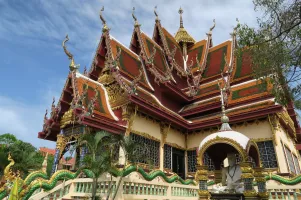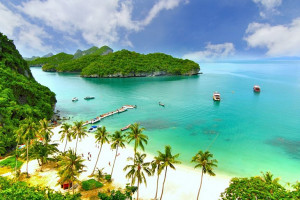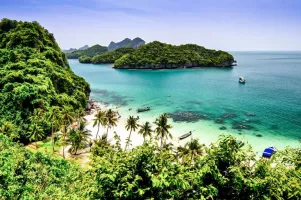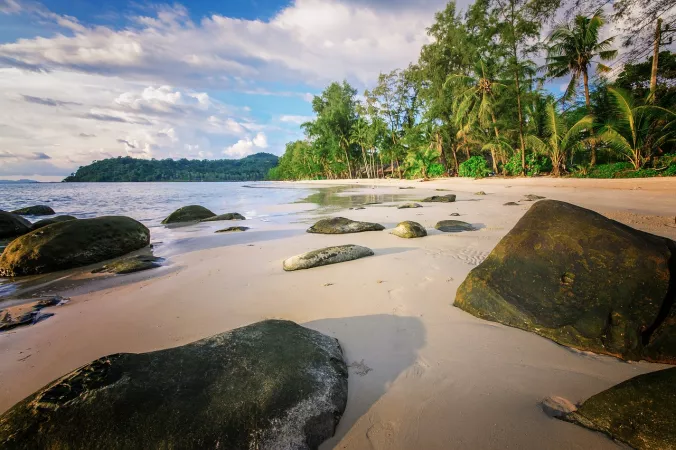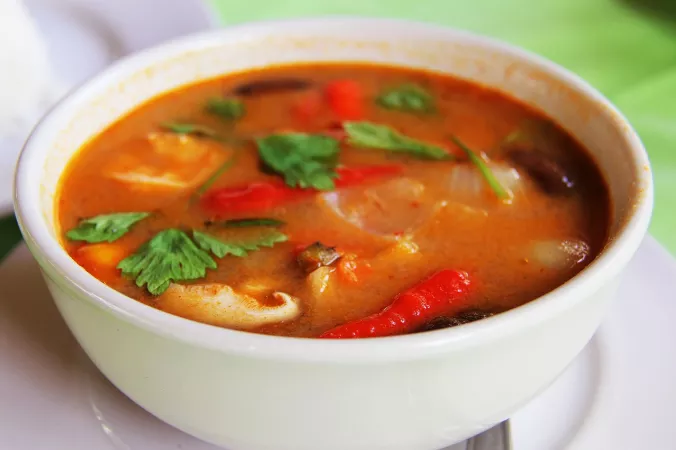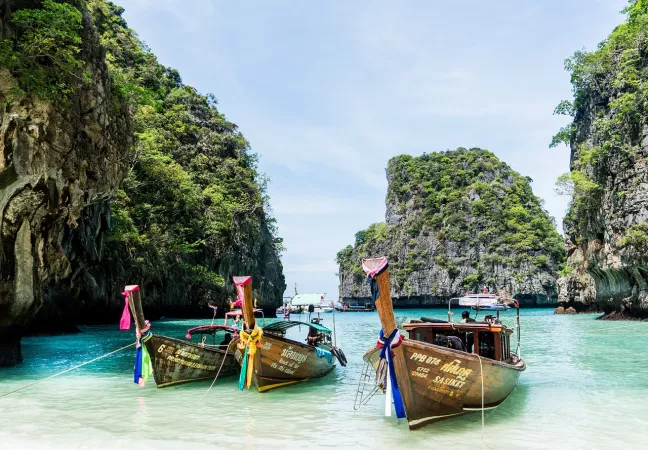
Koh Samui Travel Guide
Koh Samui, a tropical paradise in Thailand, is renowned for its stunning beaches, crystal-clear waters, and lush greenery. With a rich history dating back to the Chinese traders and Malay fishermen, the island offers a blend of cultural influences. Koh Samui is famous for its vibrant nightlife, luxury resorts, and traditional Thai festivals.Top Attractions in Koh Samui
- Big Buddha Temple
- Ang Thong National Marine Park
- Wat Plai Laem
- Grandfather and Grandmother Rocks
- Chaweng Beach
Koh Samui is Famous for
Beautiful beaches and vibrant nightlife.Top Attractions in Koh Samui
- Exploring Angthong Marine Park
- Visiting the Big Buddha Temple
- Relaxing at Chaweng Beach
- Snorkeling at Koh Tao
- Shopping at Fisherman's Village
What's Great about Travelling to Koh Samui?
- Stunning beaches and crystal-clear waters
- Rich cultural heritage and vibrant nightlife
- Luxury resorts and traditional Thai festivals
What's Not So Great about Travelling to Koh Samui?
- High tourist crowds, especially during peak season
- Expensive compared to other Thai destinations
- Limited public transportation options on the island
Travel Tips for Koh Samui
- Check visa requirements before traveling
- Rent a scooter for easy island exploration
- Stay hydrated and use sunscreen due to the tropical climate
Important Koh Samui trip information
- Ideal Duration: 5-7 days
- Best Time to Visit: December to February
- Nearby Airports and Railway Stations: Samui International Airport and Surat Thani Railway Station
Per Person
40,000
*EXCLUDING APPLICABLE TAXES 5.0 Ratings
( 101 Reviews )
( 101 Reviews )
Per Person
52,000
*EXCLUDING APPLICABLE TAXES 5.0 Ratings
( 393 Reviews )
( 393 Reviews )
Per Person
48,900
*EXCLUDING APPLICABLE TAXES Per Person
43,999
*EXCLUDING APPLICABLE TAXES FAQ's on Koh Samui
Q1: What is the best time to visit Koh Samui?
Koh Samui is best visited during the dry season from December to February when the weather is sunny and pleasant, making it ideal for beach activities and exploration. The monsoon season from September to November should be avoided due to heavy rainfall. Travelers can also consider visiting during the shoulder seasons of March to August for fewer crowds and lower prices, although there may be occasional showers. Festivals like Songkran in April and Loy Krathong in November offer unique cultural experiences for visitors.
Q2: Do I need a visa to travel to Koh Samui?
Tourists from many countries, including the US, UK, and EU nations, can enter Thailand visa-free for up to 30 days if arriving by air and 15 days if arriving overland. Visitors must have a passport valid for at least six months beyond their stay. For longer stays, a tourist visa can be obtained from Thai embassies or consulates before travel. It's important to check the latest visa requirements and regulations before your trip to ensure a smooth entry into Koh Samui.
Q3: What are the must-visit attractions in Koh Samui?
Koh Samui boasts a variety of attractions, including the Big Buddha Temple, the stunning Na Muang Waterfalls, the vibrant Fisherman's Village in Bophut, and the magical Hin Ta and Hin Yai Rocks. Travelers can explore the Ang Thong Marine Park for snorkeling and kayaking adventures or relax on the pristine beaches of Chaweng and Lamai. For a cultural experience, don't miss the Mummified Monk at Wat Khunaram or the local markets for shopping and culinary delights. Koh Samui offers a perfect blend of natural beauty, cultural heritage, and recreational activities for all types of travelers.
Q4: Is Koh Samui a safe place to travel?
Koh Samui is generally a safe destination for travelers, with low crime rates. However, it's advisable to take standard precautions such as safeguarding personal belongings and avoiding isolated areas at night. It's recommended to drink bottled water and be cautious of street food hygiene to prevent any health issues. Travelers should also be mindful of wildlife and respect the natural environment. While the local people are friendly and welcoming, it's important to be aware of cultural differences and behave respectfully to ensure a safe and enjoyable trip.
Q5: What is the local currency in Koh Samui and can I use credit cards?
The local currency in Thailand is the Thai Baht (THB). ATMs are widely available in Koh Samui, especially in popular tourist areas, allowing visitors to withdraw cash easily. Credit cards are accepted at most hotels, upscale restaurants, and larger stores, but it's advisable to carry cash for smaller establishments and local markets. Inform your bank of your travel plans to prevent any issues with card transactions abroad. Exchanging currency can be done at banks, currency exchange booths, and some hotels, but rates may vary, so it's recommended to compare before exchanging.
Q6: What is the local cuisine like in Koh Samui?
Koh Samui offers a diverse culinary scene with a mix of traditional Thai flavors and international influences. Visitors can savor fresh seafood dishes like Tom Yum Goong (spicy shrimp soup) or Gaeng Keow Wan Gai (green curry with chicken) at local restaurants and street stalls. Don't miss trying the famous Pad Thai noodles or Som Tum (papaya salad) for a burst of authentic Thai flavors. Vegetarians and vegans will find plenty of options with dishes like Tofu Satay and Vegetable Stir-Fries. Fresh tropical fruits like mangoes and coconuts are abundant and make for refreshing treats. Exploring night markets like Chaweng Walking Street allows travelers to sample a variety of local dishes and experience the vibrant food culture of Koh Samui.
Q7: What transportation options are available in Koh Samui?
Koh Samui offers various transportation options for travelers to explore the island conveniently. Taxis are readily available, but it's recommended to negotiate fares before the journey or opt for metered taxis. Renting a scooter or car is a popular choice for independent exploration, with many rental agencies across the island. Public songthaews (shared trucks) operate on fixed routes and are an affordable way to get around Koh Samui. For island-hopping or day trips, speedboats and ferries are available to visit nearby destinations like Koh Phangan and Koh Tao. It's advisable to plan transportation in advance, especially during peak tourist seasons, to ensure a smooth and efficient travel experience in Koh Samui.
Q8: Are there any cultural norms or etiquette I should be aware of when visiting Koh Samui?
When visiting Koh Samui, it's important to respect local customs and traditions to have a positive interaction with the community. Modest clothing is recommended when visiting temples or religious sites, with shoulders and knees covered out of respect. Remove shoes before entering someone's home or a temple. Greeting locals with a traditional "wai" (placing your palms together and bowing slightly) shows politeness and is appreciated. It's customary to show respect for the Thai monarchy and avoid any disrespectful gestures or actions. Bargaining is common at markets, but it should be done politely and with a smile. Learning a few basic Thai phrases like "hello" (Sawasdee) and "thank you" (Kap kun kap/ka) can go a long way in fostering friendly interactions with the locals during your stay in Koh Samui.
Q9: I am a travel agent. How can I buy travel leads of Koh Samui?
Register yourself as a travel agent at agents.tripclap.com and then you can buy travel leads to Koh Samui once your account is approved. For more details contact our support team at +91-8069186564 or support@tripclap.com
